Ofcom ponders how to rid the internet of horridnessOfcom ponders how to rid the internet of horridness
Nobody’s in favour of censorship but freedom comes at a price, right? This is essentially the premise for a new Ofcom discussion paper on online content.
September 18, 2018

Nobody’s in favour of censorship but freedom comes at a price, right? This is essentially the premise for a new Ofcom discussion paper on online content.
Entitled ‘Addressing harmful online content’, the document has been published alongside some research specially commissioned into people’s concerns about online content. Its stated aim is to initiate a public conversation about this stuff but it gives the impression of trying to set the course of that debate in the direction of greater regulation and censorship.
The tension between security and freedom is as old as civilization and there are some standard techniques for persuading people to surrender their autonomy. A word currently in vogue is ‘harm’, which has the benefits of being emotive, universally disapproved of and yet broad enough to be subject to constant redefinition. If you can get people to agree that harm must be opposed then you can establish consensus on anything else so long as you position it in opposition to harm.
If harm alone isn’t emotive enough then it’s just a simple matter of determining the freedom you want to take away is harmful to children, and this is where many arguments in favour of regulating the internet start. Also likely to make an early appearance are ‘but’ phrases such as ‘the internet offers many benefits but…’ or ‘freedom of speech is important but it comes with responsibilities.’
The Ofcom discussion document is no different, but (you see, it’s easily done) it does appear to aspire to some degree of balance and thoroughness. After the standard preamble about children needing to be protected from horridness online (which is hard to disagree with, the question is how), it notes that regular broadcast TV is a lot more regulated than online platforms like YouTube.
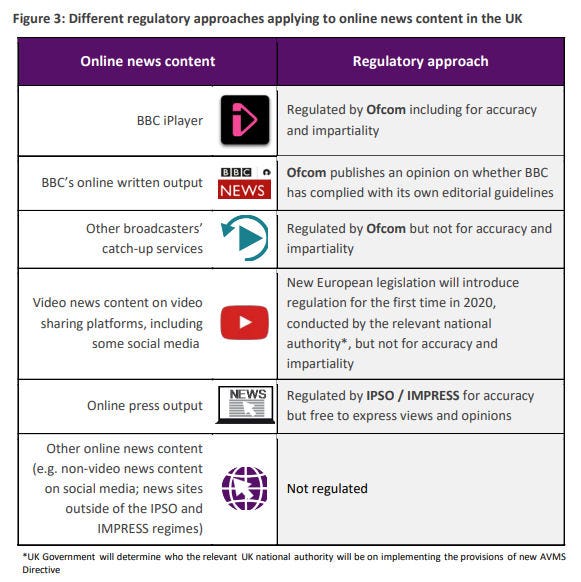
The stuff about the BBC is irrelevant as it’s tax-funded and thus subject to a unique level of state interference. Ofcom gets to keep an eye on other broadcasters’ catch-up services but has no role in any other online content. It reckons other online press is regulated by IPSO, which is not even approved as a regulator, and IMPRESS, which is not acknowledged by the press. We can assure you that Telecoms.com has had any contact with either, but perhaps we will after this.
Ofcom also laments the different amounts of regulation a piece of video is subject to depending on how it’s consumed. Live TV gets a lot of oversight, catch-up less so and YouTube none right now. The growing impression is that a lot of this ‘discussion’ is targeted very specifically at YouTube, which also happens to be where children increasingly go to for video.
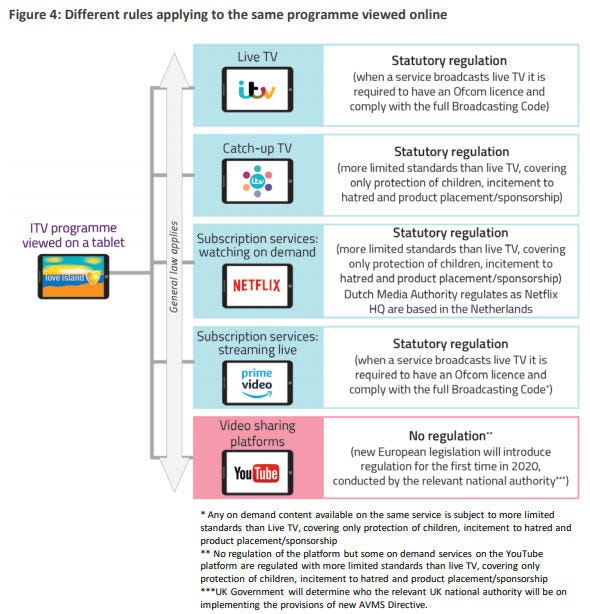
The document then moves on to a cherry-picked selection of anecdotes describing positive outcomes of the kind of regulation it seems Ofcom would like to see more of. In the absence of equivalent negative anecdotes, how can Ofcom expect this to be considered evidence in any honest and rigorous sense of the word?
More balance is shown when the document moves onto the challenges of trying to regulate a platform such as YouTube. They include the scale of the platform, the variety of content on it, the fact that much of it is user-generated and the fact that it’s global. There is also a genuine attempt to explore the dichotomy we flagged up at the start of freedom versus security.
“Another relevant principle is the safeguarding of freedom of expression,” says that passage. This means that people are able to share and receive ideas and information without unnecessary interference, such as excessive regulations or restrictions. When the need to protect audiences from harm comes into tension with the need to preserve free expression, the weight that a regulator places on the two aims reflects the priorities set by Parliament, as well as audiences’ evolving attitudes.
“Depending on the weight attributed in an online context, there is a risk that regulation might inadvertently incentivise the excessive or unnecessary removal of content that limits freedom of speech and audience choice. Such concerns have been raised in the context of the new German law.”
“Our experience in regulating broadcasting shows that while balancing audience protection and freedom of expression is not straightforward, it can be done in a way that is transparent, principles based and fair. Applying this to an online world might translate into greater attention to the processes that platforms employ to identify, assess and address harmful content – as well as to how they handle subsequent appeals.”
A lot of very good points were made by that passage, but the concluding one would seem to fundamentally undermine calls for greater regulation. These platforms (as well as the press) already have loads of processes in place to tackle exactly the harmful stuff Ofcom seems to be worried about. Many would argue YouTube has already gone too far in this respect (albeit mainly to placate advertisers), but in any case doesn’t that render calls for regulation redundant?
Another part of this discussion document that seems somewhat self-defeating is the research. You can see the headline data points below, which seems to indicate the majority of the UK is pretty worried about a bunch of stuff online. This in turn would appear to be a clear call to action for Ofcom and the government to intervene in order to reassure and protect the anxious electorate.
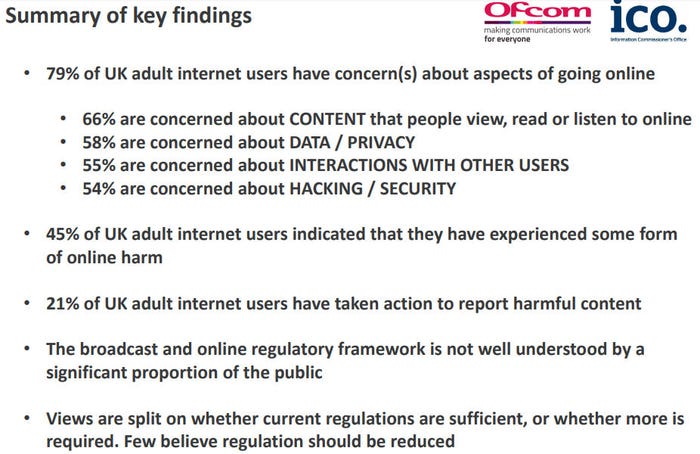
But when you navigate through the supporting documents you can see a very big gulf between spontaneous and ‘prompted’ responses. It is to Ofcom’s credit that it has been so transparent about the findings, but it must also know that the vast majority of media will simply report the headline figures without nuance or caveat. That sounds dangerously close to the kind of ‘fake news’ that everyone claims to be so worried about online.
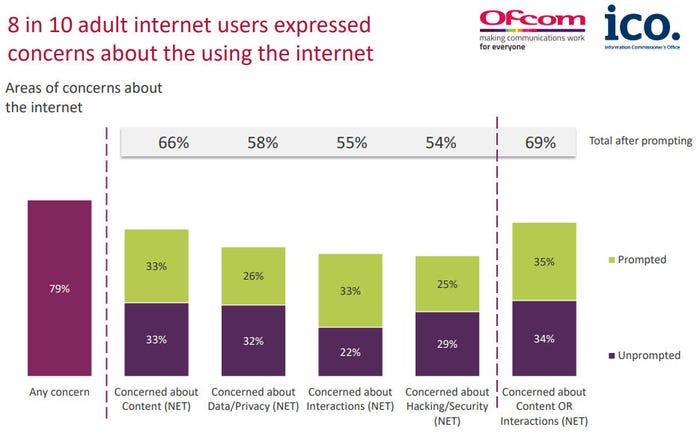
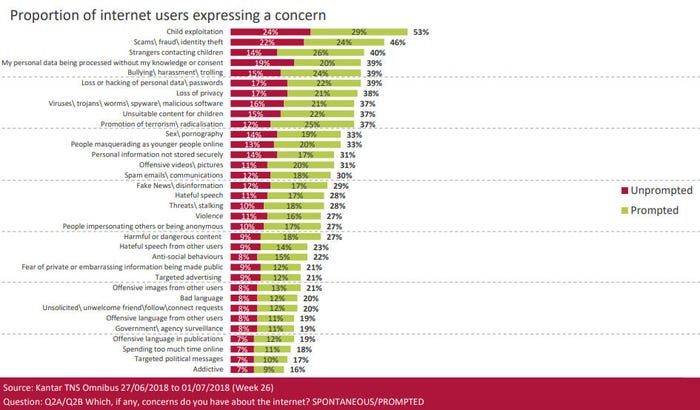
It’s right that Ofcom should take the lead in initiating a (somewhat belated) public discussion on how the wild west of the internet should be regulated, if at all. But it’s hard to escape the impression that its desired outcome will be new powers and laws that restrict online activity in the name of shielding our delicate, innocent eyes and ears from ‘harm’. If the internet is all about greater choice then shouldn’t we be trusted to decide for ourselves what’s in our own best interests?
About the Author
You May Also Like










.png?width=300&auto=webp&quality=80&disable=upscale)


_1.jpg?width=300&auto=webp&quality=80&disable=upscale)